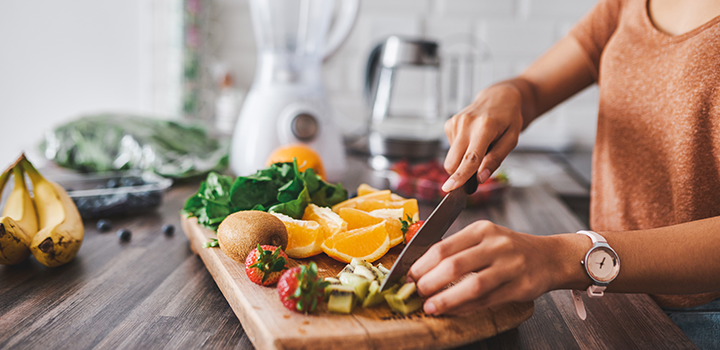Tips for eating well during the pandemic

Adapting our daily behaviour includes taking care of our health. One of the ways we can stay safe during the COVID-19 pandemic is to eat healthily.
Vitality dietitian Terry Harris says that now and over the long term, our behaviour will directly affect how we manage the pandemic. "Along with preventative behaviours like wearing a mask and regular handwashing, we can protect ourselves with nutritious food and exercise," she says.
Although there are no "miracle foods" that can cure COVID-19 or prevent you from catching it (or any other virus), people who follow a well-balanced diet tend to be healthier, with stronger immune systems and a lower risk of getting ill. This is because many nutrients are involved in the normal functioning of the immune system.
A healthy diet is also linked to good mental health.
"It's easy to lose our routine of healthy eating while staying at home, but small steps towards a healthier diet can go a long way," says Terry.
Here are some of her suggestions:
- Eat a variety of fresh and unprocessed foods every day to get the vitamins, minerals, dietary fibre and other nutrients your body needs.
- Stay hydrated - but choose your drinks wisely. Ideally, have plain water when you're thirsty. You can also drink unsweetened herbal teas or water infused with fresh fruit, such as lemon slices. Avoid sugary drinks like fizzy drinks, fruit juices, syrups and fruit-juice concentrates.
- Avoid highly processed foods because these are often high in sugar, fat and salt. Cutting down on these foods will significantly lower your risk of becoming overweight or obese, which is a risk factor for becoming severely ill from COVID-19. It will also reduce your risk of heart disease, stroke, diabetes and certain types of cancer.
- Eat a variety of plant foods - fruit, vegetables, legumes (like lentils and beans) and nuts. "A simple diet with whole foods is best," says Terry. "Go for wholegrains like brown rice, barley, millet, oats, and quinoa instead of refined starches. A healthy wholegrain snack is popcorn!"
Keep these tips in mind next time you buy groceries:
- Try to use unsaturated fats (found in oily fish, avocado, nuts, olive and canola oils) rather than saturated fats (found in fatty meat, butter, palm and coconut oils, cream, cheese, ghee and lard).
- Choose fat-free or low-fat dairy over full-cream options.
- Skip processed meats like cold meats and sausages. Choose healthy proteins such as fish, skinless chicken, eggs and tofu instead.
- For snacks, choose raw vegetables and fresh fruit rather than sugary or salty foods like biscuits, chocolate or crisps.
Giving the body good nutrition means the immune system is better supported, which can help people fight the virus. "People who don't eat well have a higher risk of becoming ill and a longer duration of illness," says Terry, "but certain nutrients can help reduce inflammation and tissue damage caused by the virus."